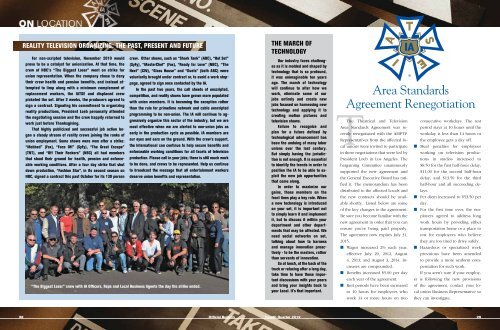Fourth Quarter 2012 - IA.TSE Local 80
Fourth Quarter 2012 - IA.TSE Local 80
Fourth Quarter 2012 - IA.TSE Local 80
- No tags were found...
Create successful ePaper yourself
Turn your PDF publications into a flip-book with our unique Google optimized e-Paper software.
Reality television organizing: The past, present and futureFor non-scripted television, November 2010 wouldprove to be a catalyst for unionization. At that time, thecrew of NBC’s “The Biggest Loser” went on strike forunion representation. When the company chose to denytheir crew health and pension benefits, and instead attemptedto limp along with a minimum complement ofreplacement workers, the <strong>IA</strong><strong>TSE</strong> and displaced crewpicketed the set. After 2 weeks, the producers agreed tosign a contract. Signaling his commitment to organizingreality productions, President Loeb personally attendedthe negotiating session and the crew happily returned towork just before Thanksgiving.That highly publicized and successful job action begana steady stream of reality crews joining the ranks ofunion employment. Some shows were won after a strike:“Mobbed” (Fox), “Face Off” (SyFy), “The Great Escape”(TNT), and “Off Their Rockers” (NBC) all had membersthat stood their ground for health, pension and enforceableworking conditions. After a four day strike that shutdown production, “Fashion Star”, in its second season onNBC, signed a contract this past October for its 130 personcrew. Other shows, such as “Shark Tank” (ABC), “Hot Set”(SyFy), “MasterChef” (Fox), “Ready for Love” (NBC), “TheNext” (CW), “Glass House” and “Duets” (both ABC) werevoluntarily brought under contract or, to avoid a work stoppage,agreed to sign once contacted by the <strong>IA</strong>.In the past two years, the call sheets of unscripted,competition, and reality shows have grown more populatedwith union members. It is becoming the exception ratherthan the rule for primetime network and cable unscriptedprogramming to be non-union. The <strong>IA</strong> will continue to aggressivelyorganize this sector of the industry, but we aremost effective when we are alerted to non-union jobs asearly in the production cycle as possible. <strong>IA</strong> members areour eyes and ears on the ground. With the crew’s support,the International can continue to help secure benefits andenforceable working conditions for all facets of televisionproduction. Please call in your jobs; there is still much workto be done, and crews to be represented. Help us continueto broadcast the message that all entertainment workersdeserve union benefits and representation.“The Biggest Loser” crew with <strong>IA</strong> Officers, Reps and <strong>Local</strong> Business Agents the day the strike ended.The March ofTechnologyOur industry faces challengesas it is molded and shaped bytechnology that is so profound,it was unimaginable ten yearsago. The march of technologywill continue to alter how wework, eliminate some of ourjobs entirely and create newjobs focused on harnessing newtechnology and applying it tocreating motion pictures andtelevision shows.Failure to recognize andplan for a future defined bytechnological advancement hasbeen the undoing of many laborunions over the last century.But simply having the jurisdictionis not enough. It is essentialto identify the trends in order toposition the <strong>IA</strong> to be able to exploitthe new job opportunitiesthat come along.In order to maximize ourgains, those members on thefront lines play a key role. Whena new technology is introducedon your set, it is important notto simply learn it and implementit, but to discuss it within yourdepartment and other departmentsthat may be affected. Weneed social networks on set,talking about how to harnessand manage innovation proactively- to be the masters, ratherthan servants of innovation.So at lunch, at the back of thetruck or relaxing after a long day,take time to have these importantdiscussions with your peersand bring your insights back toyour <strong>Local</strong>. It’s that important.Area StandardsAgreement RenegotiationThe Theatrical and TelevisionArea Standards Agreement was recentlyrenegotiated with the AMPTP.Representatives from the affected localunions were invited to participatein these negotiations that were led byPresident Loeb in Los Angeles. Thebargaining Committee unanimouslysupported the new agreement andthe General Executive Board has ratifiedit. The memorandum has beendistributed to the affected <strong>Local</strong>s andthe new contracts should be availableshortly. Listed below are someof the key changes to the agreement.Be sure you become familiar with thenew agreement in order that you canensure you’re being paid properly.The agreement now expires July 31,2015.n Wages increased 2% each year,effective July 29, <strong>2012</strong>, August4, 2013, and August 3, 2014. Increasesare compounded.n Benefits increased $5.00 per dayeach year of the agreement.n Rest periods have been increasedto 10 hours for employees whowork 14 or more hours on twoconsecutive workdays. The restperiod stays at 10 hours until theworkday is less than 14 hours orthe employee gets a day off.n Meal penalties for employeesworking on television productionsin studios increased to$8.50 for the first half-hour delay,$11.00 for the second half-hourdelay, and $13.50 for the thirdhalf-hour and all succeeding delays.n Per diem increased to $53.50 perday.n For the first time ever, the employersagreed to address longwork hours by providing eithertransportation home or a place torest for employees who believethey are too tired to drive safely.n Hazardous or specialized workprovisions have been amendedto provide a more uniform compensationfor such work.If you aren’t sure if your employeris following the new provisionsof the agreement, contact your localunion Business Representative sothey can investigate.28 Official Bulletin<strong>Fourth</strong> <strong>Quarter</strong> <strong>2012</strong> 29
















